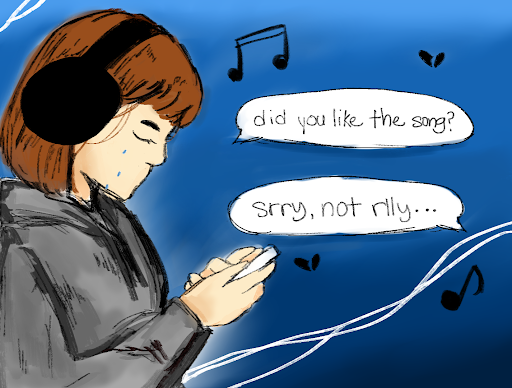Recommending Music Only Ends in Hurt Feelings

Picture by Tiffani Pe
Picture this: you’ve been exploring new music on Spotify, and you find a new song you really like while listening. It resonates with you—like the singer wrote just the right words. You like it so much that you recommend it to a friend. FINALLY, more people will appreciate this song!
“I hate it,” they say. “It’s bland, cringy, and exactly like [obscure musician]’s music.” Suddenly, you feel bad about yourself. Why didn’t they like it? And what does this say about MY music taste?
This happens a lot to me, and I’m sure to most music-goers. It’s as if anytime I recommend music, it always ends in hurt feelings.
Recommending music has two sides: the recommender and the receiver. If you’re on the recommending end, you’re likely passionate about a song and feel an emotional connection with the piece. You’re hoping maybe someone will get the same experience.
This puts the receiver in a difficult place. Part of you expects a certain response—preferably positive. I mean, you wouldn’t recommend a lousy song, right? So if that person doesn’t like it, it’s hard not to feel some twinge of hurt. Why didn’t they like it? Is it really a bad song? Did I just waste their time? It’s like meeting the sweetest person on a date, but they turn you down for a second.
On the other hand, recommending music puts the receiver in a bad spot. You want to give their music a try, but you also don’t want to hurt their feelings. What do you do? If you give it a try, but it’s just not your type of music, how do you express that to your friend who’s expectantly waiting for a reply? I can hardly say no to people; I don’t think I would survive.
The solution: understanding each side. Honestly, there is no way to solve this problem. Of course, you could not recommend music to anyone EVER, but that’s unrealistic. Instead, coming to these conversations with understanding is the best way to avoid the awkwardness of “Oh, it wasn’t really my type.”
Just giving their recommendation a chance means enough. It’s okay to not like their music taste; just be mindful of the other person’s connection with it and respectful of how they feel. And when recommending, understand that it puts the receiver in an uncomfortable situation, and you shouldn’t expect them to love it just because you do.
So, the next time you want to share a song, consider who you’re sharing it with. I mean, after all, not everyone is a Taylor Swift fan.

Hi there! My name is Diego Caceres, and I’m the Editor-in-Chief for The Ubiquity, which means I edit articles and approve everything posted on the website....

Hello again, Quartz Hill! My name is Tiffani Pe, and I’ll be serving as an assistant Copy Editor for the QHHS Ubiquity. Being a senior IB student with...







